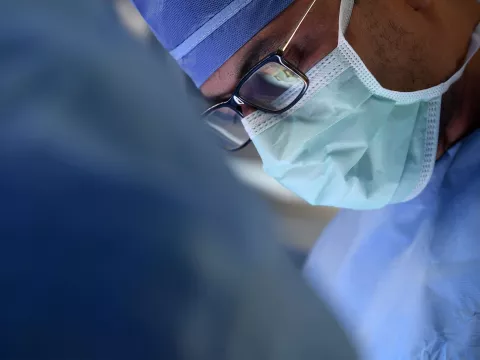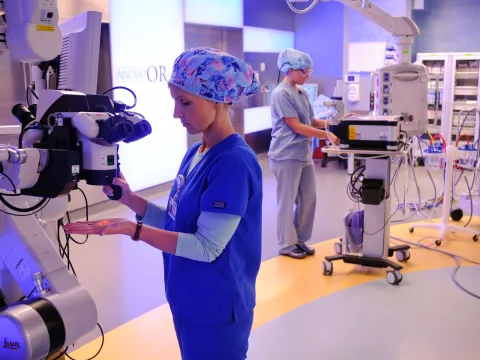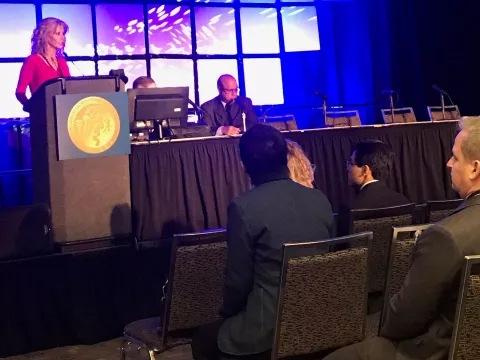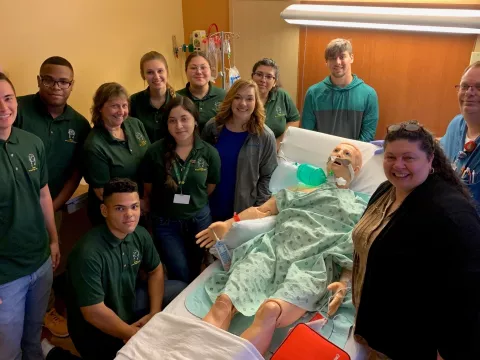- AdventHealth Digestive Health Institute

AdventHealth Digestive Health Institute (DHI) surgeons Sharona Ross, MD, FACS, and Iswanto Sucandy, MD, FACS, gave presentations at the Clinical Congress 2019 of the American College of Surgeons (ACS). The event, held October 27 – 31 in San Francisco, keeps ACS members and other interested surgeons aware of the latest advances in the “art and science of Surgery.” More than anything else the ACS does, the Clinical Congress helps surgeons raise their practice standards so patients can ultimately benefit from cutting-edge care. Based on their wealth of experience, Dr. Ross and Dr. Sucandy, both ACS fellows and together with Dr. Alexander Rosemurgy have the busiest robotic pancreatic and liver surgery program in the U.S., shared insights they had discovered by using robotic surgery to treat esophageal, gastric, pancreatic, liver and gallbladder cancers. Additionally, Dr. Ross presided over a session at the meeting devoted to discussing pancreatic surgery.
Presentation #1 – Esophageal Cancer: Robotic Transhiatal Esophagectomy
At the congress, Dr. Ross, an advanced foregut and HPB surgeon at DHI, presented about hers and Dr. Rosemurgy’s surgical outcomes related to the use of the surgical robot for the transhiatal esophagectomy, a minimally invasive procedure that removes part of the esophagus to treat esophageal cancer. While the surgical robot allows for this operation to be done as a closed procedure, Dr. Ross wanted to make sure their patients still receive the best outcomes from esophagectomy.
Dr. Ross and Dr. Rosemurgy’s team found that DHI’s surgical outcomes for robotic esophagectomy were similar to the outcomes that were nationally reported by surgeons for esophagectomy in general. In fact, after their procedures, DHI patients did better than the national average in several areas. The study concluded that using the surgical robot for transhiatal esophagectomy was justified given that the patients did as well or better than with an open operation.
Presentation #2 – Liver Cancer: Robotic Hepatic Resection – An Institutional Experience and Outcome
More and more patients are having parts of their livers removed with robotic surgery which prompted Dr. Sucandy, an HPB surgeon at DHI, to look closely at surgical outcomes from this type of procedure. Dr. Sucandy and Dr. Rosemurgy’s team analyzed the experiences of 105 DHI patients who had robotic liver surgery (hepatic resection) at DHI between 2017 and 2019. They did this by looking at how long each operation took, the total time patients were under general anesthesia, how long they stayed in the hospital after surgery and any complications they experienced.
Because of its complex nature, a robotic surgical approach often adds time to an operation, and Dr. Sucandy and Dr. Rosemurgy found that there were areas in which their team could work to reduce the amount of time a patient was under anesthesia. However, they concluded that given that complications experienced by DHI patients are rare, a robotic approach to liver surgery is safe and effective. In fact, it can be an ideal approach that gives patients faster recoveries and requires shorter hospital stays.
Presentation #3 – Gallbladder Cancer: Robotic Cholecystectomy and Central Hepatectomy
The final presentation at the 2019 ACS Clinical Congress from DHI surgeons was a video presentation by Dr. Sucandy. In this talk, he showed and narrated a video of an operation in which they treated a patient with cancer by removing the gallbladder and part of the liver through use of the surgical robot. Dr. Sucandy and Dr. Rosemurgy were one of the nation’s first surgeons to offer robotic liver surgery, making them one of the most qualified and experienced individuals to teach others about this approach.
If you or a loved one needs surgery for cancer, a minimally invasive approach may shorten recovery time and allow other treatment to begin sooner.
Recent News

For her dedication and excellence in patient care, Patient Preferred Physicians and Practitioners proudly named Dr. Sharona B. Ross, MD, FACS, a Patient Preferred Surgeon for upper gastrointestinal...

Alexander Rosemurgy, MD, FACS, an advanced foregut and HPB surgeon at AdventHealth Digestive Health Institute (DHI), spoke at the 4th annual Intuitive 360 conference.

The experts at AdventHealth Digestive Health Institute (DHI) are at the forefront in the adoption and application of robotic surgery for conditions of the digestive system. The complexity of advanced...

According to the American Cancer Society, metastatic liver cancer, or cancer that has spread to the liver from the part of the body where it originated, is the most common form of liver cancer, with...

Sharona Ross, MD, FACS, advanced HPB surgeon with AdventHealth Tampa gave a podium presentation today at the 2019 Society of Gastrointestinal and Endoscopic Surgery (SAGES) meeting in Baltimore, MD...

The International Hepato-Pancreato-Biliary Association will be hosting its 13thIHPBA World Congress in Geneva, Switzerland from Tuesday, September 4th, 2018 to Friday, September 7th, 2018.

This past weekend, our team participated in the Lustgarten Foundation Pancreatic Cancer Research Walk in Tampa Bay.

The Women in Surgery Career Symposium took place last weekend, February 16ththrough 18th, at the Wyndham Grand Hotel in Clearwater Beach.

The Southeastern Surgical Congress (SESC) was recently held at the CAMLS Simulations Center in Tampa, Florida, bringing together some of the greatest minds in surgical fields from around the country.

Dr. Sharona Ross of the AdventHealth Digestive Health Institute was invited to present at the American College of Surgeons conference in San Diego this week.

The B.E.S.T. Academy is a four-week training, mentoring, and educational program for up-and-coming students.

Girls, Inc. is a nationwide organization that works diligently to ensure that the young girls and women of America are not missing important economic, education, and employment opportunities,
